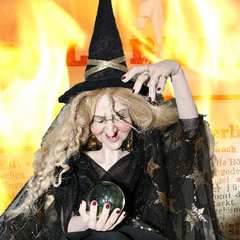
Local news media never know quite how to cover Pagan events, and the unease is mutual. Decades of being ignored (except during Halloween season) and misrepresented have left plenty of Pagans shy around the press. After all, no one wants to be baited, be ridiculed, or show up on the evening news with “area cult member” under their name.
When a reporter interviews local Pagans and snaps a few photos, the resulting news story will typically contain one of the following: A blandly well-meaning overview of Pagan beliefs, complete with some quotes from “totally normal” Pagans. Or, a thinly veiled sideshow of all the freaky-deaky beliefs and behaviors (complete with quotes from the wackiest Pagans the reporter could locate). Some writers even attempt to split the difference—giving the outward appearance of a respectful visitor while sending knowing winks to their audience about all the weirdos on parade.
As a news-reading Pagan, I’ve become so accustomed to these journalistic conventions that I was truly surprised to read a blatantly snarky write-up of Madison, Wisconsin's 2015 Pagan Pride Day event. (See “I spent my Saturday praising the gods of old”.)
Ostensibly there to “educate” himself, Aaron Hathaway instead delivers a series of digs about the sights, sounds, and smells resulting from a gathering of Pagans in the park. It’s obviously a student newspaper piece—no commercial news outlet would have the guts to run something so insensitive. As urban anthropology, it fell flat, as the reporter didn’t bother to interview any actual Pagans. As satire, it seemed misplaced and mean-spirited—as pointless as lampooning a junior varsity game or a church carnival.
The article had some of Madison PPD’s attendees and organizers crying foul. Besides the piece’s sarcastic tone, they objected to the fact that Hathaway apparently did not ask permission to take pictures and did not identify himself as a member of the press. The entire thrust of the piece was disingenuous: The writer obviously did not come to learn about a minority religion, but instead to make fun of Pagans in Madison.
I also found the article offensive (along with others like it that are slightly more subtle in their derision). And yet, I have to admit Hathaway was right in some of his observations. (For starters: Smartwatches do look stupid with kilts.) I caught myself nodding in recognition at a few of his jabs at the festival and festival-goers. As much as we may hate their tone, it is occasionally beneficial for our insular community to take in the observations of outsiders.
For instance, our intrepid student reporter states that the “main attraction” of Madison PPD was the row of vendor tents on a soccer field. The same critique could certainly be made about many Pagan festivals around the country—that they are heavy on shopping and light on content.
Do these vendors provide entertainment and education to their tribe? Of course they do. Is Paganism really mainly about buying stuff? I don’t believe so, but I can understand how it may appear this way to non-Pagans. We have lots of Pagan stores, but fewer temples and seminaries to point to. Quality workshops and panels don’t reach many Pagans, especially in the South and Midwest. Perhaps if we did more to nurture our Pagan organizers, teachers, and ritualists, the vendors’ row wouldn’t be such an easy target for cynics.
Later on, our fearless guide tells us, “If I were asked to define Paganism based simply on my experiences at this event, I would guess it’s a mixture of viking roleplay, animism and ethnically ambiguous arts and crafts.” Ouch.
And yet, I just can’t un-hear the phrase “ethnically ambiguous arts and crafts.” I hear it in my mind at every Pagan event as I sway in my jingle belt and leather gauntlets. It echoes as I walk through rows of dragons and dreamcatchers and OM symbols swaying in the breeze. Clearly, Paganism is a path without a concise cultural identity--our greatest strength, some say. But it’s a curse as well as a blessing. Our collective reputation suffers when we are unable to have those tough conversations about cultural appropriation and incompatible belief systems.
What’s the point, my Pagan family? We have to be able to laugh at ourselves. To the rest of the world, Pagan reconstructionism and “real” witchcraft are pretty silly ideas. Some of the things we believe and do are, at least on the surface, totally absurd. Pagans will probably always be the butts of jokes, so why not laugh along? The difference is that our laughter can come from a place of affection, not scorn. We can use it as a tool to build our communities, not tear them down.
When the media portray us in less-than-flattering ways, we need to do more than just look away, get pissed off, or fire off a rebuttal to some local news editor. We need to consider if maybe—just maybe—that it’s pointing to a problem with the way we do things, or to a wrong perception we can work to correct. If we feel up to it as individuals, we should engage with the media and try to combat misinformation—even if we suspect that our words will be mixed up in another by-the-numbers Pagan news story.
Here’s my suggestion: The next time I find my blood boiling over some ignorant, exploitative piece of mainstream news reporting about Pagans, I’m going to take a time out. I’m going to read it slowly and quantify all of its assumptions about Pagans and Paganism. I’ll sort them into what’s totally incorrect, what’s skewed, and what may have a grain of truth. I'll respond how I feel I need to. And then I’ll let it go.
Because in the end, what matters is who we are, not what people say about us. But even our harshest critics can help us find and mend our flaws.
